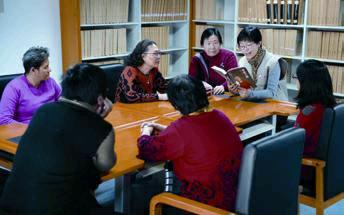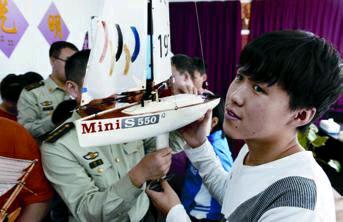Unseen Exams
2014-02-17ByWangHairong
By+Wang+Hairong
December 18, 2013 was an important day not only for Li Jinsheng, a blind man in central Chinas Henan Province, but also for all visually impaired people in the country who aspire to receive a university education. On that day, Li received a call from the Education Bureau of Henans Queshan County informing him that he had been successfully registered for the annual national college entrance exam.
Only a few days prior, Li applied to sit the exam in 2014, but was rejected. The Higher Education Admissions Office of Zhumadian City in Henan said that his application could not be accepted because test papers in Braille were not available.
Li did not give up. He repeatedly contacted education authorities at different levels all across Henan and finally received the positive response he was looking for.
Despite Lis final success, the initial rejections that he received raised widespread public concern. Article 54 of Chinas Law on the Protection of the Disabled Persons, which was amended back in 2008, stipulates that if visually impaired persons are to sit government-organized school admission or professional qualification exams, they should either be provided with test papers in Braille, electronic test papers, or assistance from designated staff.
“The national college entrance exam is conducted by the government, so stipulation is applicable in this case,” said Huang Rui, a lawyer with Henans Boyang Law Firm.
Li Qingzhong, Director of the ParentsCommittee of the China Blind Persons Association, said that the main reason blind persons were unable to take the national college entrance exam is that education authorities and universities have not attached sufficient importance to blind persons rights and interests.
Li believes that special test papers and teaching equipment for the blind should be available if enough effort and money are expended. “If they want to find a solution, they can find one,” he said.
Xu Jiacheng, a professor at the Special Education College of Beijing Union University, said that many people believe it is too costly to produce test papers in Braille. Xu suggested that electronic test papers could be used instead.
Limited access
As of the end of 2010, China had 12.63 million visually impaired people, accounting for nearly 15 percent of all disabled individuals in the country, according to the China Disabled Persons Federation.endprint
Chinas Education Law, which has been implemented since 1995, stipulates that disabled persons have an equal right to receive education. Significant progress has been made in giving disabled persons access to education in recent years. Nonetheless, data from the China Disabled Persons Federation show that at the end of 2012, 28 percent of school-aged children with disabilities in China are still unable to enroll.
Discrimination and inadequate allocation of special education resources are the biggest obstacles for children with disabilities, said Xu with Beijing Union University.
“Especially in less developed areas, parents and teachers still think there is no need to educate children with disabilities,” Xu said.
For instance, Guizhou Province in southwest China has about 9,400 blind children aged 6 to14, fewer than 10 percent of whom were enrolled in school during the 2011-12 academic year, according to local news portal Gywb.cn.
A statistical report released by the Ministry of Education revealed that in 2012 only 40,900 visually impaired students were enrolled in nineyear compulsory education.
Few choices
Most blind students in the country receive education in special schools dedicated to their needs, from the primary to university level. One teacher working in such an institution revealed to Gmw.cn, the news portal of Beijing-based Guangming Daily on condition of anonymity.
When they become too old for compulsory education, most blind students go to vocational secondary schools to study massage, with a small minority entering universities, according to Wang Rui, a 28-year-old human resources manager working for a blind massage parlor.
Wang lost her eyesight in his childhood and spent more than 10 years studying at a school for the blind. She said that currently, out of safety concerns, schools for the blind are mostly boarding schools, where students only return home once a week or even once a semester. Some children enter such schools when they are as young as 7 years old and spend about a dozen years there, which makes it difficult for them to integrate into society, according to Wang.
Wang said that during her time at primary and junior middle schools, her class once had as many as 20 students, but only two continued into high school, because they knew even if they could get into university, they could only specialize in a narrow selection of majors such as massage and piano tuning.endprint
Currently, only a few universities located in Beijing, Shanghai and Changchun in northeast Chinas Jilin Province have special programs for blind students. Students are usually recruited separately through special exams.
There are few majors for blind students to choose from. Zhang Ping, a 31-year-old visually impaired person in Shanghai, said that in his city, only the Special Education Department of East China Normal University and the Social Work Department of Shanghai Normal University admit blind students.
Zhang added that his college classmates had diversified interests, such as computer programming, dubbing, mathematics, literature and music, but they could only major in the fields offered by the above two universities.
Zhang studied psychology at the Special Education Department of East China Normal University, but his primary interests are computer programming and English. So he taught himself computer programming and translation. Now, he works as a customer service representative for an online store at Taobao.com.
Although the current education system for the blind can help them make a living, it also hinders them from pursuing other personal interests, the anonymous teacher in Beijing said.
Independent study
An alternative to get credentials without enrolling in universities is to self-study and pass higher education self-learning exams. A student needs to pass a series of exams, usually over several years, to get a degree this way.
The right for the visually impaired to sit selflearning exams is also hard earned.
About 10 years ago, when Li in Henan applied to take the self-learning exams in traditional Chinese medicine, he encountered obstacles.
“At that time, the self-learning exams were not open to blind people … I lobbied the education authority for days, and eventually got their permission to register. During the exams, someone helped me by reading test questions and writing down my answers,” Li recalled.
Before Li could pass all the required exams, however, the self-learning exams in traditional Chinese medicine were canceled and Li was forced to continue with his career as a masseuse.
Now, Li operates a massage store employing several blind persons. Yet he still wants a career change.
“I feel I am not different from others. I can do many of the things they can. Technology is so advanced nowadays that I can read books with a computer and get around with a mobile navigation system,” Li said. He added that currently, he is interested in law and wants to study it in university.endprint
Like Li, Dong Lina, a 29-year-old blind girl from northeastern Dalian City in Liaoning Province, is also pursuing her own dreams.
Dong once worked as a masseuse after graduating from a school for the blind in Dalian in 2003. Although she could make enough money to be self-sufficient, she was not content. She would like to be a radio host.
In 2006, Dong received broadcast training offered by the Beijing Hongdandan Education and Culture Exchange Center, and with recommendation from the center, she began her work as an online broadcaster for an Internet company.
In 2010, she won fourth place in a national competition for recital and was the only blind prize-winner. She was then granted an opportunity to take free courses at the Beijing-based Communications University of China.
To get her degree, Dong decided to take the higher education self-teaching exams. In 2011, when she registered to take the selflearning exams in broadcasting and hosting in Beijing, she was rejected because of her visual impairment.
After her application was denied, she received support from a lawyer and the public. Eventually, the Beijing Education Examination Authority decided to open the exams to Dong and to other visually impaired people.
Dong took the first of a series of exams in January 2012. She said that during the exam, a teacher read the test questions for her, and then she typed answers into a computer equipped with special voice-to-text software. The test papers were later printed and sealed before they were graded.endprint
